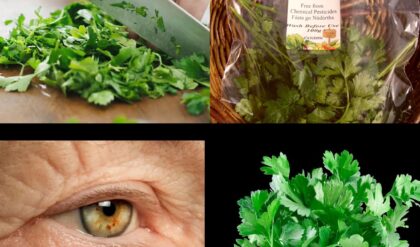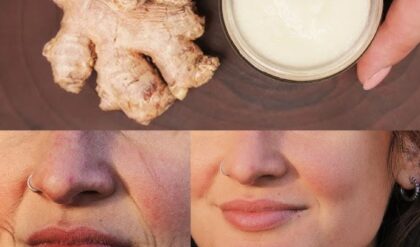Turmeric, a golden spice celebrated for its vibrant color and potent health benefits, has been a staple in traditional medicine for centuries. Its active compound, curcumin, is known for its powerful anti-inflammatory and antioxidant properties. For individuals over the age of 50, incorporating turmeric into the daily routine can provide a host of health benefits, supporting overall well-being and addressing age-related health concerns. Here’s what happens when you take turmeric every day after turning 50.

1. Reduced Inflammation and Joint Pain
As we age, chronic inflammation becomes a common concern, often leading to joint pain and conditions like arthritis. Turmeric’s curcumin has natural anti-inflammatory properties that help reduce swelling and pain in joints. Regular consumption of turmeric can improve mobility, making it a valuable remedy for individuals dealing with osteoarthritis or rheumatoid arthritis.
2. Enhanced Brain Health
Cognitive decline is a common concern after 50, but turmeric may help. Curcumin has been shown to increase levels of brain-derived neurotrophic factor (BDNF), a protein that supports the growth and survival of neurons. This may improve memory, reduce the risk of neurodegenerative diseases like Alzheimer’s, and enhance overall brain function.
3. Improved Heart Health
Turmeric supports heart health by reducing inflammation and oxidative stress, two key factors in heart disease. Curcumin may help regulate blood pressure, lower bad cholesterol (LDL), and improve blood vessel function. For individuals over 50, these benefits can reduce the risk of heart-related complications.
4. Boosted Immune System
The immune system often weakens with age, making the body more susceptible to illnesses. Turmeric’s antioxidant properties can strengthen the immune system by neutralizing harmful free radicals and reducing inflammation. This helps the body better defend against infections and chronic diseases.
5. Better Digestion
Digestive issues, such as bloating, gas, and indigestion, are common in older adults. Turmeric stimulates bile production, which aids in breaking down fats and improving digestion. Additionally, its anti-inflammatory effects can soothe the digestive tract, alleviating symptoms of conditions like irritable bowel syndrome (IBS).
6. Potential Cancer Prevention
Curcumin has been studied for its potential to prevent and slow the growth of certain types of cancer cells. Its antioxidant and anti-inflammatory properties help protect cells from damage that can lead to cancer. While not a cure, turmeric can be a supportive addition to a cancer-prevention strategy.
7. Supports Skin Health
After 50, skin begins to lose elasticity and may become prone to wrinkles, dryness, and discoloration. Turmeric’s antioxidants combat free radicals, protecting the skin from premature aging. Its anti-inflammatory properties can also soothe skin conditions like eczema and psoriasis, promoting healthier, more radiant skin.
8. Manages Blood Sugar Levels
For those at risk of or managing type 2 diabetes, turmeric may help regulate blood sugar levels. Curcumin improves insulin sensitivity and reduces inflammation associated with diabetes, making it a helpful addition to a diabetic-friendly diet.
9. Promotes Liver Detoxification
The liver plays a vital role in detoxifying the body, but its efficiency can decline with age. Turmeric supports liver function by enhancing the production of enzymes that break down toxins and protect the liver from damage. This can lead to better overall health and increased energy levels.
10. May Aid in Weight Management
Maintaining a healthy weight often becomes more challenging with age due to slower metabolism and hormonal changes. Turmeric may support weight management by reducing inflammation and improving metabolic function. Its ability to regulate fat storage and reduce obesity-related inflammation makes it a helpful ally in maintaining a healthy weight.
How to Incorporate Turmeric Into Your Daily Routine
- Turmeric Tea: Brew a soothing turmeric tea by boiling turmeric powder or fresh turmeric root with water. Add honey, ginger, or lemon for extra flavor and health benefits.
- Golden Milk: Combine turmeric with warm milk (or a plant-based alternative), black pepper, and a touch of honey for a comforting and nutritious drink.
- Supplements: If cooking with turmeric isn’t convenient, curcumin supplements are a highly effective way to get its benefits. Look for supplements with black pepper (piperine) to enhance absorption.
- Cooking: Use turmeric powder in soups, stews, curries, or sprinkle it over roasted vegetables for a flavorful boost.
Precautions and Considerations
While turmeric is generally safe, consuming it in large amounts may cause side effects, such as stomach upset or thinning of the blood. Consult your doctor before taking turmeric supplements, especially if you are on blood thinners or other medications. It’s also important to consume turmeric with black pepper or healthy fats to enhance curcumin absorption.
Conclusion
Taking turmeric every day after age 50 can bring a range of health benefits, from reducing inflammation and joint pain to supporting heart, brain, and skin health. Its versatile use in cooking, drinks, and supplements makes it easy to incorporate into your daily routine. By including this powerful spice in your diet, you can enjoy a healthier and more vibrant life as you age. Start reaping the benefits of turmeric today and embrace its natural healing power!





